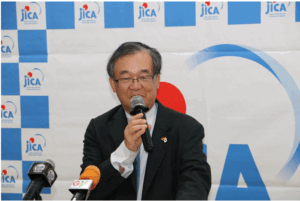
Ghana and Japan Strengthen Academic Ties Through JICA Chair Programme
Ghana and Japan are deepening their academic partnership through the JICA Chair programme, a collaborative initiative between the University of Ghana (UG) and the Japan International Cooperation Agency (JICA). The 3rd iteration of this programme recently spotlighted the evolving role of artificial intelligence (AI) in Japanese media.
The Japanese Ambassador to Ghana, Hiroshi Yoshimoto, emphasized the strong foundation of mutual respect and shared goals underpinning the relationship between the two nations. Education, he noted, is a cornerstone of this cooperation.
Supporting Capacity Building in Ghana
Japan has consistently supported capacity-building initiatives in Ghana through scholarships and academic exchange programs. Ambassador Yoshimoto highlighted several key programs:
- MEXT Scholarship: A program offering opportunities for Ghanaian students to pursue higher education in Japanese universities.
- JDS (Japan Development Scholarship) for Public Officials: Tailored for government officials, this scholarship aims to enhance their expertise and contribute to Ghana's development.
- ABE Initiative (African Business Education Initiative for Youth): Focused on fostering business leaders and entrepreneurs in Africa, this initiative provides opportunities for young Ghanaians to study and intern in Japan.
These programs are specifically designed to cultivate the potential of Ghana's younger generation and contribute to their future success.
University of Tokyo and University of Ghana Collaboration
Ambassador Yoshimoto also underscored the enduring partnership between the University of Tokyo and the University of Ghana. This collaboration facilitates valuable dialogues between students from both institutions, fostering discussions about the future of education and providing a platform for academic exchange, mutual learning, and the strengthening of ties between Japan and Ghana. He encouraged the continuation and expansion of such collaborations.
The Philosophy of Kaizen
A key aspect of Japanese education, according to Ambassador Yoshimoto, is the incorporation of the "Kaizen" philosophy, which emphasizes continuous improvement. Japanese-style education instills moral values such as teamwork and a strong sense of responsibility, principles that align closely with Kaizen. These values, he believes, offer valuable insights that can positively influence and strengthen Ghana’s educational system.
AI and the Future of Journalism: A Japanese Perspective
The lecture, titled "From Ink to Intelligence: The Future of Japanese Journalism in the AI Era," explored the profound impact of AI on the field of journalism. Ambassador Yoshimoto noted that journalism, a vital pillar of democracy, stands at a crucial juncture.
AI technologies are reshaping news production, offering tools that enhance efficiency. However, this technological advancement also raises significant ethical considerations. It is crucial, he stressed, to ensure that journalism remains focused on its core mission of serving the public good amidst the rapid development and integration of AI.
"As we enter a new era wherein AI is reshaping everything around us, it has become important for us to strengthen collaboration among our researchers and institutions; whether in the areas of education, technology, agriculture, journalism or others," he stated.
JICA's Role in Strengthening Understanding
Suzuki Momoko, the Chief Representative of JICA Ghana, emphasized that the special lecture is part of the ongoing collaboration under the JICA Chair programme in Ghana. The programme seeks to deepen mutual understanding of Japan's development experience and culture. "Through such exchanges, our relationship continues to grow stronger," she added.
TICAD9: A Focus on African Development
Ms. Momoko also announced the upcoming 9th Tokyo International Conference on African Development (TICAD9), scheduled to take place from August 20–22 in Yokohama, Japan.
TICAD, a major international conference led by the Japanese government in partnership with the United Nations, the World Bank, and the African Union, has been a pivotal platform for discussing Africa's development since 1993.
TICAD9 will bring together African leaders and experts from across the continent and beyond to discuss sustainable development and cooperation. JICA anticipates that TICAD9 will play a significant role in further strengthening the bonds between Japan and African countries, particularly Ghana.
Navigating Tradition and Transformation in Japanese Journalism
Professor Hayashi Kaori, Executive Vice President of the University of Tokyo, delivered the lecture, tracing the evolution of Japanese journalism from its roots in 19th-century print culture to its current engagement with AI.
Despite Japan's established legacy in newspaper journalism, the industry faces increasing pressure to innovate while maintaining editorial integrity.
Media organizations are approaching the adoption of AI for automation and content generation with caution, taking into account ethical considerations, accuracy concerns, and regulatory implications. Japan's uniquely conservative and institution-driven media landscape shapes its approach to technological change.
By examining this historical and cultural continuity, the lecture offered insights into how Japanese journalism is navigating the complex interplay between tradition and transformation in the age of AI.


No comments:
Post a Comment